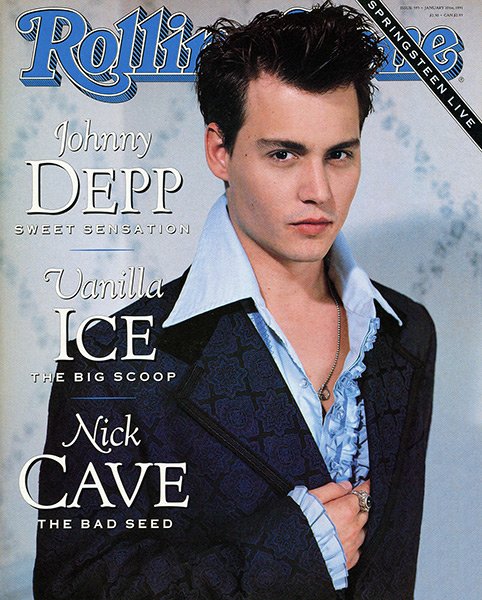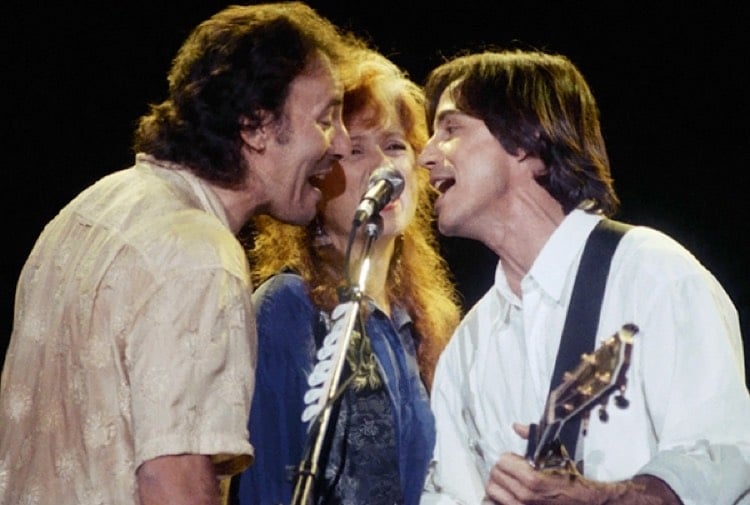

When everybody starts believing those big illusions,” said Bruce Springsteen from the stage of the Shrine Auditorium, in Los Angeles, “you end up with a government like the one we’ve had for the past decade.” The occasion was the second of two benefit concerts given by Springsteen, Bonnie Raitt and Jackson Browne on November 16th and 17th for the Christic Institute, an organization that is pursuing a lawsuit against a group of United States-sponsored covert operatives for allegedly bombing a press conference in Nicaragua in 1984. The song Springsteen was introducing was “Reason to Believe,” from Nebraska, and the specific illusion he referred to was the American government’s belief in its inalienable right to police the world and shape the destiny of other sovereign nations.
Springsteen’s endorsement of the Christic Institute and its conviction that an ongoing conspiracy of government officials and former military and intelligence officers has played a major role in American foreign policy over the past three decades represents a far more radical stance than he has ever before taken. In his characteristic fashion, however, Springsteen managed to put a human face on the array of complex, far-ranging political issues the Christic Institute lawsuit addresses. His two masterful solo acoustic sets – his first live appearances since the close of the Amnesty International Human Rights Now! world tour in October of 1988 – were breathtakingly moving explorations of how self-deceit, romantic illusions and fantasies of control corrupt the bedroom and the boardroom, personal as well as political affairs, and poison human experience. With remarkable emotional sophistication, Springsteen was able to dramatize both the damage such illusions inflict and the difficulty and pain involved in giving them up for a real world that is far from a utopia.

The first evening’s show was more taut and gripping, if less relaxed, than the second. Walking out of the wings to center stage without an introduction, his hair grown long and swept back, Springsteen was clearly tense. Strumming an acoustic guitar, he mentioned not having “done this in a while” and told the audience, “If you’re moved to clap along, don’t – it’ll mess me up.” He then set the tone for the night with a stark, intense – and simply spectacular – reading of “Brilliant Disguise,” a song about the virtual impossibility of understanding your own emotions, let alone another person’s. His singing strong and supple, Springsteen incited howls of excitement with the subtlest gestures, such as sliding his voice into a fragile falsetto on certain line endings. “Is it me, baby, or just a brilliant disguise?” Springsteen nearly whispered to the crowd of 6200 people witnessing his return to the public eye. The question seemed far from innocent a little later when, after a fan screamed, “We love you, Bruce,” Springsteen responded, without a shred of irony, “But you don’t really know me.”
A modified arrangement of “Darkness on the Edge of Town” was somewhat less successful – it would work far more effectively the next night – but a haunted “Mansion on the Hill,” with Springsteen providing a plaintive harmonica solo, proved riveting. The singer bemoaned how “over the past decade the country’s been sold an illusion of itself” and praised the Christic Institute for “trying to make us grow up” by way of leading into “Reason to Believe,” which he souped up with a chilling slide-guitar part.
The set took an amusing turn when Springsteen – obviously in a 2 Live Bruce mood – hauled out a song he’d written the night before called “Redheaded Woman,” which he dedicated to “my two favorite redheads”: Bonnie Raitt and, of course, Patti Scialfa. “Well, now, listen up, stud, your life’s been wasted,” Springsteen wailed over a propulsive rockabilly beat, “till you been down on your knees and tasted a redheaded woman.” In “57 Channels,” another funny new song with a rockabilly feel, Springsteen described shooting out his television Elvis style because “there’s fifty-seven channels, man, and nothing on.”
The fun halted with a heart-stopping version of “My Father’s House,” which Springsteen prefaced with a wrenching description of how, “three or four times a week,” late at night, by himself, he used to drive past the houses in which he grew up with his parents. Concerned, he consulted a psychiatrist, who explained that “something went wrong” in those houses, something broke down, and that Springsteen was driven to return to the scene in a desperate, compulsive effort to “make it right.” “But,” the psychiatrist concluded, “you can’t.” The song ends: “My father’s house shines hard and bright/It stands like a beacon calling me in the night/Calling and calling so cold and alone/Shining across this dark highway where our sins lie unatoned.”
Bruce Springsteen-Highway 61 w/ Jackson Browne and Bonnie Raitt (Christic Shows, November 16, 1990)
Across The Borderline-Bruce Springsteen,Jackson Browne,Bonnie Raitt(16-11-1990 Shrine Auditorium,LA)
Bruce Springsteen – Red Headed Woman (Acoustic Live 1990-11-17)
Christic Institute Benefit News Coverage
The Christic Institute: Heart Of The Matter BBC 1987
The degree to which Springsteen’s tangled feelings about his parents have been reactivated – possibly by his having a child of his own – was evident the following night, when he replaced “My Father’s House” with “The Wish,” a poignant song about his mother. “If pa’s eyes were windows into a world so deadly and true,” he sang, accompanying himself on guitar. “You couldn’t stop me from looking, but you kept me from crawling through.” While Springsteen’s struggle with his tormented feelings about his father fuels his greatest art – “My Father’s House” is, significantly, a far more compelling song than “The Wish” – his feelings about his mother account for the sweeter, more vulnerable aspects of his personality.
On Friday night, Springsteen moved over to the piano after “My Father’s House” for “Tenth Avenue Freeze-Out.” Despite the raw energy of Springsteen’s R&B-flavored rendition, that song – along with the spellbinding, introspective version of “Thunder Road” he performed later, also at the piano – essentially served as an elegy for the E Street Band. Hearing Springsteen belt out a line like “When the change was made uptown/And the Big Man joined the band” as he sat alone on the large, dark stage was a powerful moment. “I’m all alone, I’m on my own,” he sang. “And I can’t find my way home.”
Brilliant, spare versions of “Atlantic City” and “Nebraska” framed Friday night’s biggest surprise: the rarely performed “Wild Billy’s Circus Story,” from The Wild, the Innocent and the E Street Shuffle. A new song called “When the Lights Go Out” – about deception, corruption of spirit and the darker elements within us – followed “Nebraska.” “Thunder Road” – which Springsteen stopped midsong because he forgot the lyrics, shaking his head and saying, “I knew this would happen” – came next, and a stunning, mournful “My Hometown,” performed on piano, closed the set proper.
For his encore, Springsteen played a new song at the piano, a stirring ballad called “Real World,” which he co-wrote with E Street Band pianist Roy Bittan and dedicated on Saturday night to Patti Scialfa, who was backstage with their new baby, Evan James. A bracing, hymnlike love song, “Real World” is about abandoning fairy-tale fantasies and accepting the limits and delights of the possible. “Ain’t no church bells ringing, ain’t no flags unfurled,” sang the man whose storybook marriage ended bitterly and whose most popular tour became an orgy of flag-waving. “Just me, you and the love we’re bringing into the real world.”

Jackson Browne and Bonnie Raitt – whose opening sets were strong but, unfortunately, entirely overwhelmed by Springsteen’s performance – then joined Springsteen for a rousing cover of Bob Dylan‘s “Highway 61 Revisited.” The trio alternated lead vocals and harmonized on the choruses. Browne’s driving acoustic rhythm guitar – Springsteen played harmonica and Raitt rattled a tambourine – turned Dylan’s blackly humorous tale of profit frenzy and war fever into an insinuating boogie workout With Browne playing piano, Springsteen playing acoustic guitar and Bonnie Raitt playing slide guitar, the night ended with a feeling rendition of Ry Cooder‘s “Across the Borderline.” A song about Central and South American immigrants who come to Texas to find a “broken promised land,” it provided a touching multicultural complement to the domestic dislocation of Springsteen’s “My Hometown.”
tip: most convenient way to listen while browsing along is to use the popup button of the player.
On Saturday night, in addition to substituting “The Wish” for “My Father’s House,” Springsteen deleted “Wild Billy’s Circus Story” and “Atlantic City” and added “State Trooper,” a stately, dignified reading of “Tougher Than the Rest” and a new song called “Soul Driver.” Taken together, the two shows – beginning with a “Brilliant Disguise” and ending in the “Real World” – demonstrated that Springsteen’s ability to seize the moment onstage and make palpable the meaning of potent emotional and social issues has not at all diminished. He continues to look deep inside himself and find a world there, a world we can enter to learn a bit about how a life proceeds, to learn a bit about ourselves and our own world.
“I built a shrine in my heart/It wasn’t pretty to see/Made out of fool’s gold, memory and tears cried,” Springsteen sang in “Real World.” “Well, now I’m heading over the rise.” It’s a necessary trip, and with as much conviction as ever, he’s taking us along with him.
More info: The Christic Institute Archives








 Visitors Today : 38
Visitors Today : 38 Now Online : 0
Now Online : 0



































































































